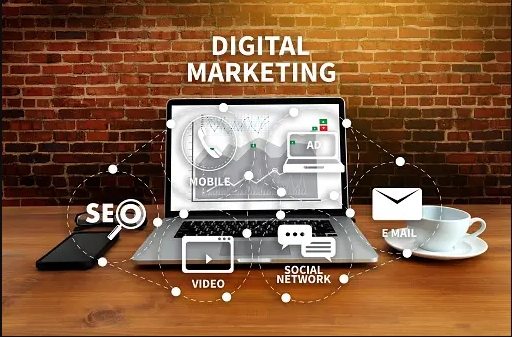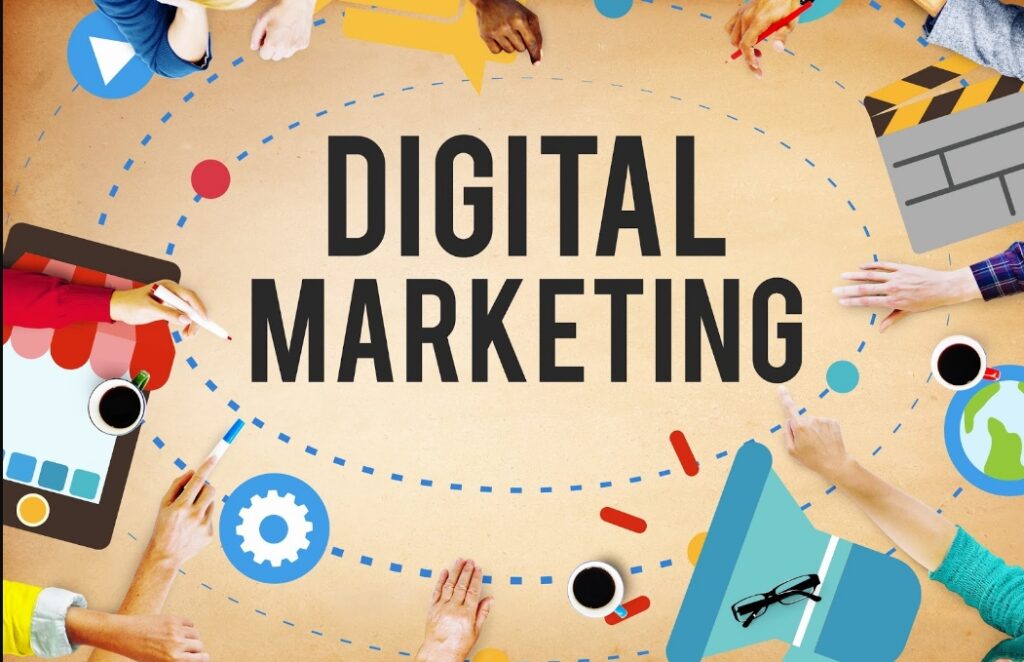Introduction to Digital Marketing
Digital marketing is the art and science of promoting products, services, and brands through online channels and digital technologies. It has transformed the way businesses engage with customers, offering a wide range of tools and platforms to reach a global audience. In a world where consumers increasingly turn to the internet for information, shopping, and communication, digital marketing provides an essential avenue for businesses to connect, influence, and convert potential buyers.
Digital Marketing: A Comprehensive Review
Digital marketing has become a crucial component of business strategy in today’s connected world. It refers to all online marketing efforts used by companies to promote products, services, and brands. Leveraging the internet and digital channels such as websites, social media platforms, search engines, email, and mobile apps, digital marketing allows businesses to reach, engage, and convert their target audience. Here’s a detailed review of digital marketing, its core strategies, and the benefits it offers.
1. Key Components of Digital Marketing
a) Search Engine Optimization (SEO):
- Overview: SEO involves optimizing a website’s content, structure, and backend code to rank higher on search engine results pages (SERPs), making it more discoverable by users searching for relevant keywords.
- Benefits: Increased organic traffic, long-term brand visibility, and credibility with users who trust higher-ranking websites.
- Tools: Google Analytics, SEMrush, Ahrefs.
b) Pay-Per-Click Advertising (PPC):
- Overview: PPC is a model where advertisers pay a fee each time their ad is clicked. These ads appear on search engines like Google (via Google Ads) or social media platforms like Facebook and Instagram.
- Benefits: Instant visibility, targeted audience reach, and measurable results. PPC is particularly useful for driving traffic and leads in a short time frame.
- Tools: Google Ads, Bing Ads, Facebook Ads Manager.
c) Social Media Marketing (SMM):
- Overview: SMM involves using platforms like Facebook, Instagram, Twitter, LinkedIn, and TikTok to build brand awareness, engage with customers, and promote products or services.
- Benefits: Enhanced customer interaction, viral marketing potential, and the ability to humanize a brand through direct engagement.
- Tools: Hootsuite, Buffer, Sprout Social.
d) Content Marketing:
- Overview: This strategy focuses on creating, publishing, and distributing valuable content to attract and engage a target audience. Examples include blog posts, videos, podcasts, infographics, and ebooks.
- Benefits: Drives organic traffic, builds trust and authority in the industry, and provides value to customers throughout their buying journey.
- Tools: WordPress, Canva, BuzzSumo.
e) Email Marketing:
- Overview: Email marketing involves sending targeted messages to individuals on an email list to nurture relationships, share updates, or promote products and services.
- Benefits: Cost-effective, high ROI, personalized communication, and direct access to customers’ inboxes.
- Tools: MailChimp, Constant Contact, HubSpot.
f) Affiliate Marketing:
- Overview: Affiliate marketing is a performance-based marketing strategy where businesses reward affiliates (third-party promoters) for driving traffic or sales through their referral links.
- Benefits: Expanded reach without upfront costs, results-driven payouts, and the ability to tap into new customer bases.
- Tools: ShareASale, CJ Affiliate, Amazon Associates.
g) Influencer Marketing:
- Overview: This form of marketing involves partnering with influencers (people with large, engaged followings on social media or other platforms) to promote products or services.
- Benefits: Trust and credibility from influencer endorsements, increased brand awareness, and the potential for viral campaigns.
- Tools: Influencity, AspireIQ, Traackr.
h) Mobile Marketing:
- Overview: Mobile marketing targets users on smartphones and tablets through SMS, in-app advertising, push notifications, and mobile-friendly websites.
- Benefits: High engagement rates, personalized communication, and the ability to reach users on the go.
- Tools: MobileMonkey, Twilio, Braze.
2. Current Trends in Digital Marketing
a) Video Marketing:
- Trend: Video content is becoming increasingly popular, with platforms like YouTube, Instagram Reels, and TikTok gaining massive traction.
- Why it’s Effective: Video is engaging, easy to consume, and effective for storytelling, product demonstrations, and customer testimonials.
b) Artificial Intelligence and Machine Learning:
- Trend: AI and machine learning are being used to personalize user experiences, automate processes (like chatbots), and predict consumer behavior through data analysis.
- Why it’s Effective: It allows for highly personalized marketing at scale and improves customer interactions, leading to better conversions.
c) Voice Search Optimization:
- Trend: As smart speakers like Amazon Alexa and Google Home become more popular, businesses are optimizing their content for voice search queries.
- Why it’s Effective: Voice search presents an opportunity to capture a growing segment of users who search for information hands-free, often with local or immediate intent.
d) Interactive Content:
- Trend: Quizzes, polls, surveys, and interactive infographics are engaging audiences more effectively than static content.
- Why it’s Effective: It provides personalized experiences and encourages user interaction, making it easier to capture leads and keep audiences engaged.
e) Personalization:
- Trend: Personalization in digital marketing involves tailoring messages, offers, and content based on the specific needs and behaviors of individual customers.
- Why it’s Effective: Consumers are more likely to engage with content that feels relevant to them, leading to higher engagement and conversion rates.

3. Challenges in Digital Marketing
While digital marketing is highly effective, it also presents several challenges:
a) Increasing Competition:
- With more businesses investing in digital marketing, standing out in a crowded online space has become more difficult.
b) Ad Fatigue and Banner Blindness:
- Users are becoming more adept at ignoring ads, especially if they are repetitive or irrelevant, which can decrease the effectiveness of digital campaigns.
c) Data Privacy and Security:
- The introduction of stricter regulations like GDPR (General Data Protection Regulation) has made data collection more challenging, requiring marketers to prioritize user privacy and security.
d) Rapidly Evolving Technology:
- The constant evolution of digital platforms and tools requires marketers to stay updated and adapt quickly to new algorithms, trends, and technologies.
4. Benefits of Digital Marketing
a) Cost-Effective:
- Digital marketing offers a more affordable alternative to traditional marketing channels like TV or print, with the ability to track ROI in real-time.
b) Measurable Results:
- Tools like Google Analytics, social media insights, and email analytics allow businesses to track performance and adjust strategies based on data.
c) Targeted Marketing:
- Digital marketing enables businesses to target specific demographics, behaviors, interests, and locations, ensuring that the right message reaches the right audience.
d) Global Reach:
- Unlike traditional marketing, which is often limited by geography, digital marketing has a global reach, allowing businesses to expand beyond local markets.
e) Better Engagement:
- Digital platforms allow for real-time interaction between brands and customers, whether through social media comments, email responses, or customer support chats.

Benefits of Digital Marketing
- Global Reach:
Digital marketing enables businesses to connect with a worldwide audience, breaking geographical barriers and expanding market reach. - Cost-Effective:
Compared to traditional marketing methods, digital marketing offers more affordable options, such as social media ads and email campaigns, with a higher return on investment (ROI). - Targeted Advertising:
Digital marketing allows for precise targeting based on demographics, interests, and behavior, ensuring that marketing efforts are directed towards the most relevant audience. - Measurable Results:
Advanced analytics and tracking tools provide real-time insights into campaign performance, allowing businesses to measure effectiveness and make data-driven decisions. - Enhanced Engagement:
Direct interaction with customers through social media, email, and other digital channels fosters better engagement and builds stronger relationships with the audience. - Personalization:
Digital marketing enables tailored messaging and offers based on user preferences and behavior, leading to more relevant and compelling customer experiences. - Increased Visibility:
SEO and content marketing strategies improve online visibility and help businesses rank higher in search engine results, driving more organic traffic to their websites. - Flexibility and Adaptability:
Digital marketing campaigns can be quickly adjusted or optimized based on performance data and changing market conditions, ensuring greater agility and effectiveness. - Higher Conversion Rates:
By reaching targeted audiences with personalized content and offers, digital marketing can lead to higher conversion rates and increased sales. - Access to Emerging Technologies:
Digital marketing leverages the latest technologies, such as AI, chatbots, and automation tools, to enhance marketing efforts and stay ahead of trends.
Digital Marketing short note
is the practice of promoting products, services, or brands using online channels and digital technologies. It encompasses various strategies such as search engine optimization (SEO), social media marketing, email campaigns, and pay-per-click advertising. Digital marketing leverages the internet’s reach to target specific audiences, enhance brand visibility, and drive engagement. With its ability to provide measurable results and adapt to changing consumer behavior, digital marketing is a crucial component of modern business success.
Conclusion
Digital marketing has transformed the way businesses reach and engage customers. With a variety of tools and strategies such as SEO, social media marketing, PPC, and content marketing, it provides flexible, measurable, and highly targeted opportunities for companies to grow. However, to remain competitive, businesses must adapt to emerging trends and technologies, such as AI, video marketing, and personalization, while navigating challenges like competition and data privacy concerns. By staying current and using data-driven approaches, digital marketing continues to be a powerful tool for long-term success.
